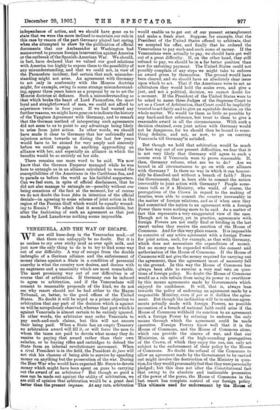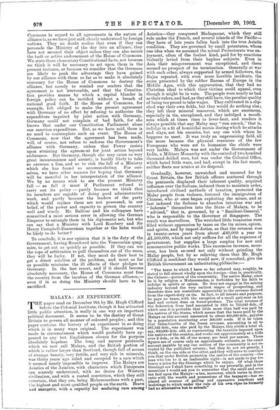VENEZUELA, AND THE WAY OF ESCAPE.
WE are still knee-deep in the Venezuelan mud,—of that there can unhappily be no doubt. But it is as useless to cry over sticky mud. as over spilt milk, and just now the only thing to do is to try to find some way out of our difficulty. A way of escape from the double imbroglio of a German alliance and the enforcement of money claims against a State in a condition of perennial anarchy is what the country now desires, and desires with an eagerness and a unanimity which are most remarkable. The most promising way out of our difficulties is of course that of arbitration. If Germany can be induced to agree to arbitration, and if the Venezuelans will consent to reasonable proposals of the kind, we do not see why resort should not be had either to the Hague Tribunal, or, better, to the good offices of the United States. No doubt it will be urged as a prime objection to arbitration that any part of the decision which is against us will be scrupulously observed, whereas that part which is against Venezuela is almost certain to be entirely ignored. In other words, the arbitrator may order Venezuela to pay such-and-such claims, but this will not ensure their being paid. When a State has an empty Treasury no arbitration award will fill it, or will force the men to whom the taxes are paid to devote what money they do receive to paying that award rather than their own salaries, or to buying rifles and cartridges to defend the State from an internal revolutionary movement. When a rival President is in the field, the President de jure will not risk his chances of being able to survive by spending money on anything but the prosecution of the war. During the Boer War who would have expected Mr. Steyn to devote money which might have been spent on guns to carrying out the award of an arbitrator ? But though so good a case can be made out against the utility of arbitration, we are still of opinion that arbitration would be a great deal better than the present impasse. At any rate, arbitration would enable us to get out of our present entanglement and make a fresh start. Suppose, for example, that the President of the United States offered to arbitrate, that we accepted his offer, and finally that he ordered the Venezuelans to pay such-and-such sums of money. If the Venezuelans were actually to pay, we should have got well out of a great difficulty. If, on the other hand, they still refused to pay, we should be in a far better position than now for enforcing payment. The United States could not possibly complain of any steps we might take to enforce an award given by themselves. The ground would have been cleared, and we should have an absolutely clear issue upon which to act. That if the Americans were to act as arbitrators they would hold the scales even, and give a just, and not a political, decision, we cannot doubt for a moment. If the President of the United States were to be asked to name three Judges of the Supreme Court to act as a Court of Arbitration, that Court could be implicitly trusted to act fairly and to give an equitable decision on the whole matter. We would tie them as little as possible by any hard-and-fast reference, but trust to them to give a reasonable award in all the circumstances. With such a decision obtained, even joint action with Germany would not be dangerous, for we should then be bound to some- thing definite, and not, as now, to go on coercing Venezuela till Germany'is satisfied.
But though we hold that arbitration would be much the best way out of our present difficulties, we fear that it is not very likely that Germany will agree to such a course even if Venezuela were to prove reasonable. If, then, Germany refuses, what are we to do ? Are we bound in all circumstances to go on with our alliance with Germany ? Is there no way in which it can honour- ably be dissolved and without a breach of faith ? Have the Government, that is, been able to commit the nation irrevocably to joint action with Germany P People some- times talk as if a Ministry, who wield, of course, the prerogatives of the Crown in regard to the making of treaties, were able to commit the country irrevocably in the matter of foreign relations, and as if when once they had committed the nation to an agreement with a foreign Power there were nothing more to be said. As a matter of fact this represents a very exaggerated view of the case. Though not in theory, yet in practice, agreements with foreign Powers are not really final or binding in the last resort unless they receive the sanction of the House of Commons. And for this very plain reason. It is impossible to conceive of any active agreement with a foreign Power for joint action, such, for example, as that with Germany, which does not necessitate the expenditure of money. But no money can be expended without the consent and authorisation of the House of Commons. If the House of Commons will not give the money required for carrying out the agreement, then the agreement must of necessity fall to the ground. In this way the House of Commons has always been able to exercise a very real veto on ques- tions of foreign policy. No doubt the House of Commons would as a rule refrain from using its power to overthrow by this means agreements made by Governments which enjoyed its confidence. It will, that is, always lean towards the policy of endorsing an agreement made by a responsible Ministry, even if per as it dislikes the agree- ment. But though the inclination will be to endorse agree- ments actually made with foreign Powers, no possible accusation of a breach of national faith could arise if the House of Commons withheld its sanction to an agreement with a foreign Power by refusing to endorse the only means through which the agreement could be made operative. Foreign Powers know well that it is the House of Commons, and the House of Commons alone, which can provide the sinews of war, and that our Ministries, in spite of the high-sounding prerogatives of the Crown, of which they enjoy the use, can only act subject to the endorsement of their policy by the House of Commons. No doubt the refusal of the Commons to allow an agreement made by the Government to be carried. out might involve the destruction of the Ministry in ques- tion, for they would presumably feel that they were personally pledged ; but this does not alter the Constitutional fact that owing to its absolute and inalienable possession of the power of the purse, the House of Commons in the last resort has complete control of our foreign policy. This ultimate need for endorsement by the House of Commons in regard to all agreements in the nature of alliance is, as we have just said, clearly understood by foreign nations. They no doubt realise that even if they can persuade the Ministry of the day into an alliance, they have not secured their object unless they can also secure the tacit or active endorsement of the House of Commons. We state these elementary Constitutional facts, not because we think it will be necessary to act upon them in the present instance, or because we consider that the Germans are likely to push the advantage they have gained by our alliance with them so far as to make it absolutely necessary for the House of Commons to destroy the alliance, but merely to remind our readers that the agreement is not irrevocable, and that the Constitu- tion provides means by which a capital blunder in foreign policy can be rectified without a breach of national good faith. If the House of Commons, for example, felt obliged to make the present agreement with Germany of no effect by refusing to authorise the expenditure required by joint action with Germany, Germany could not complain of bad faith, for she knows that under our Constitution Parliament alone can sanction expenditure. But, as we have said, there is no need to contemplate such an event. The House of Commons, now that the agreement has been made, will, of course, not refuse to endorse the Government's alliance with Germany, unless that Power insists upon straining the agreement for joint action beyond endurance. But Germany, though she may cause us very great inconvenience and anxiety, is hardly likely to take so extreme a line, and so to risk the fall of a Ministry which she has found so accommodating. For our- selves, we have other reasons for hoping that Germany will be merciful in her interpretation of the alliance. We by no means wish to see the. present Ministry fall — as fall it must if Parliament refused to carry out its policy — partly because we think that its members are capable of doing good administrative work, and partly because the leaders of the party which would replace them are not possessed, in our belief, of the power and capacity to govern the country well and wisely. Mr. Balfour and his colleagues have committed a most serious error in allowing the German Emperor to entangle them in his diplomatic net, but who can say that a Ministry with Lord Rosebery and Sir Henry Campbell-Bannerman together at the helm would be likely to do better ?
To conclude, it is our opinion that it is the duty of the Government, having floundered into the Venezuelan quag- mire, to get out as quickly as possible. If they can use the rope of arbitration to pull themselves out of the mess, they will be lucky. If not, they must do their best to get a direct solution of the problem, and must as far as possible minimise the ill effects of their pledges to Germany. In the last resort, and if it should become absolutely necessary, the House of Commons must free the country from the incubus of the German alliance,— even if in so doing the Ministry should have to be sacrificed.











































 Previous page
Previous page